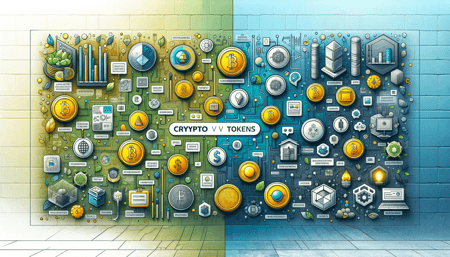The Difference Between Cryptocurrencies and Crypto Tokens
The terms 'cryptocurrency' and 'token' are often interchangeably used. However, their functions and uses are vastly different and understanding how they differ is an important step in being able to better understand and evaluate the crypto ecosystem.

Cryptocurrencies:
Cryptocurrencies are digital or virtual forms of currency that leverage cryptography for security, making them resistant to counterfeit or double-spending. They are essentially the cornerstone of blockchain networks, serving multiple key purposes.
Transactional Medium:
At its core, a cryptocurrency acts as a medium of exchange, facilitating transactions over the blockchain. It enables users to transfer value within the network securely and transparently.
Network Fuel:
Cryptocurrencies also play a crucial role in operating and maintaining the blockchain. For instance, they incentivise miners or validators to maintain network integrity by rewarding them for their efforts, which in turn ensures the blockchain's continual functionality and security.
Consensus Mechanisms:
The presence of cryptocurrencies enables the implementation of consensus mechanisms like Proof of Work (PoW) or Proof of Stake (PoS), which are vital for validating transactions and achieving network consensus.
Tokens:
Unlike cryptocurrencies, tokens are digital assets issued on top of existing blockchains. They leverage the infrastructure of the underlying blockchain for their creation, transactions and security.
Asset Digitization:
Tokens can represent a wide variety of assets or rights. They have the ability to digitise real-world assets like real estate or art, making these assets easily transferable and divisible.
Smart Contracts and DApps:
Tokens often embody smart contracts and decentralised applications (DApps), allowing for programmable and automated transactions, which can significantly expand the utility and applications of blockchain technology.
Fundraising and Governance:
Tokens have become a popular tool for fundraising through Initial Coin Offerings (ICOs) or Security Token Offerings (STOs). Furthermore, they can represent voting rights within a decentralised organisation, enabling community governance.
In summary, while cryptocurrencies act as the fundamental medium for transactions and are intrinsic to the functioning of a blockchain, tokens are built on top of existing blockchains and serve a myriad of purposes, from asset representation to enabling smart contracts and decentralised applications.


